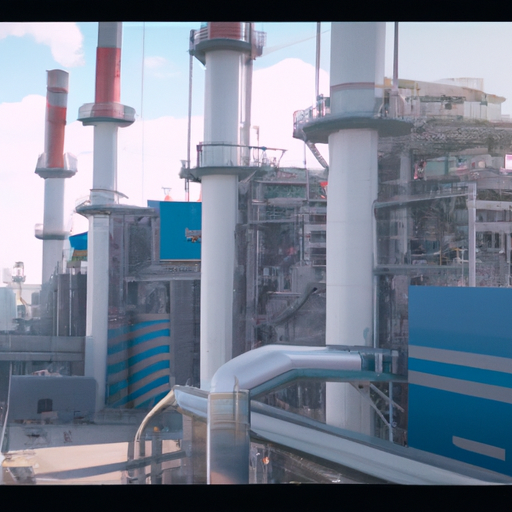-
Table of Contents
- Introduction
- What Strategies Can be Used to Reduce Costs in an NPK Industrial Manufacturing Plant?
- How to Ensure Quality Control in an NPK Industrial Manufacturing Plant
- What Safety Measures Should be Taken When Building an NPK Industrial Manufacturing Plant?
- How to Develop an Efficient Production Process for an NPK Industrial Manufacturing Plant
- What Equipment is Needed to Set Up an NPK Industrial Manufacturing Plant?
- How to Choose the Right Location for an NPK Industrial Manufacturing Plant
- Conclusion
“Unlock Your Potential with NPK Industrial Manufacturing: Building a Strong Foundation for Success.”
Introduction
Building an NPK industrial manufacturing plant is a complex process that requires careful planning and execution. It involves a variety of steps, from selecting the right location and obtaining the necessary permits to designing the facility and procuring the necessary equipment. This guide will provide an overview of the steps involved in setting up an NPK industrial manufacturing plant, including the key considerations and resources needed to ensure a successful project. With the right approach, you can create a facility that meets your production needs and helps you achieve your business goals.
What Strategies Can be Used to Reduce Costs in an NPK Industrial Manufacturing Plant?

1. Implement Lean Manufacturing: Lean manufacturing is a process that focuses on eliminating waste and improving efficiency. It involves streamlining processes, reducing inventory, and improving quality control. This can help reduce costs by reducing the amount of time and resources needed to produce a product.
2. Automate Processes: Automating processes can help reduce costs by eliminating the need for manual labor. Automation can also help reduce errors and improve quality control.
3. Utilize Technology: Utilizing technology can help reduce costs by improving efficiency and accuracy. Technology can also help reduce the amount of time and resources needed to produce a product.
4. Outsource Non-Core Activities: Outsourcing non-core activities can help reduce costs by allowing the company to focus on its core competencies. This can also help reduce overhead costs and improve efficiency.
5. Reduce Waste: Reducing waste can help reduce costs by eliminating the need for unnecessary resources. This can also help improve quality control and reduce the amount of time needed to produce a product.
6. Negotiate with Suppliers: Negotiating with suppliers can help reduce costs by getting better prices for materials and services. This can also help reduce overhead costs and improve efficiency.
How to Ensure Quality Control in an NPK Industrial Manufacturing Plant
Quality control is an essential part of any industrial manufacturing plant, especially those that produce NPK products. Quality control ensures that the products produced meet the standards set by the company and that they are safe for use. Here are some tips to ensure quality control in an NPK industrial manufacturing plant:
1. Establish Quality Standards: The first step in ensuring quality control is to establish quality standards. These standards should be based on the company’s goals and objectives and should be clearly defined. This will help ensure that all products produced meet the required standards.
2. Implement Quality Control Procedures: Once the quality standards have been established, it is important to implement quality control procedures. These procedures should include regular inspections of the production process, testing of the products, and documentation of the results. This will help ensure that the products produced meet the required standards.
3. Train Employees: It is important to train employees on the quality control procedures. This will ensure that they understand the importance of quality control and are able to properly implement the procedures.
4. Invest in Quality Control Equipment: Investing in quality control equipment is essential for ensuring quality control. This equipment should include testing and measuring devices, as well as other tools that can help detect any defects in the products.
5. Monitor Quality Control Results: It is important to monitor the results of the quality control procedures. This will help identify any areas that need improvement and ensure that the products produced meet the required standards.
By following these tips, companies can ensure quality control in an NPK industrial manufacturing plant. This will help ensure that the products produced meet the required standards and are safe for use.
What Safety Measures Should be Taken When Building an NPK Industrial Manufacturing Plant?
When constructing an NPK industrial manufacturing plant, it is essential to take the necessary safety measures to ensure the safety of workers and the environment. Here are some of the safety measures that should be taken:
1. Adequate training should be provided to all personnel involved in the construction process. This includes training on the proper use of safety equipment, such as hard hats, safety glasses, and protective clothing.
2. All personnel should be aware of the potential hazards associated with the construction process, such as hazardous materials, heavy machinery, and electrical wiring.
3. All personnel should be aware of the safety protocols that must be followed when working in the plant. This includes the use of personal protective equipment (PPE) and the proper disposal of hazardous materials.
4. All personnel should be aware of the emergency procedures that must be followed in the event of an accident or injury.
5. All personnel should be aware of the safety regulations that must be followed when operating machinery and equipment.
6. All personnel should be aware of the safety regulations that must be followed when handling hazardous materials.
7. All personnel should be aware of the safety regulations that must be followed when working in confined spaces.
8. All personnel should be aware of the safety regulations that must be followed when working at heights.
9. All personnel should be aware of the safety regulations that must be followed when working with hazardous chemicals.
10. All personnel should be aware of the safety regulations that must be followed when working with flammable materials.
By following these safety measures, the construction of an NPK industrial manufacturing plant can be completed safely and efficiently.
How to Develop an Efficient Production Process for an NPK Industrial Manufacturing Plant
Developing an efficient production process for an NPK industrial manufacturing plant is essential for ensuring the success of the business. An effective production process should be designed to maximize efficiency, minimize costs, and ensure the highest quality of the final product. This article will provide an overview of the steps necessary to develop an efficient production process for an NPK industrial manufacturing plant.
The first step in developing an efficient production process is to identify the resources available to the plant. This includes the type of equipment, the number of personnel, and the amount of raw materials available. Once the resources have been identified, the next step is to create a production plan. This plan should include the production process, the timeline for completion, and the expected output.
The next step is to develop a quality control system. This system should include the procedures for testing the raw materials, the processes for ensuring the quality of the final product, and the methods for tracking the production process. This system should also include the procedures for dealing with any issues that arise during the production process.
The third step is to create a production schedule. This schedule should include the timeline for each step of the production process, the expected output, and the resources needed to complete each step. This schedule should also include the procedures for dealing with any issues that arise during the production process.
The fourth step is to develop a system for tracking the production process. This system should include the procedures for tracking the progress of the production process, the methods for monitoring the quality of the final product, and the methods for dealing with any issues that arise during the production process.
Finally, the fifth step is to develop a system for monitoring the performance of the production process. This system should include the procedures for measuring the efficiency of the production process, the methods for tracking the quality of the final product, and the methods for dealing with any issues that arise during the production process.
By following these steps, an NPK industrial manufacturing plant can develop an efficient production process that maximizes efficiency, minimizes costs, and ensures the highest quality of the final product.
What Equipment is Needed to Set Up an NPK Industrial Manufacturing Plant?
Setting up an NPK industrial manufacturing plant requires a variety of equipment. The specific equipment needed will depend on the type of NPK fertilizer being produced. Generally, the equipment needed includes a granulator, mixer, dryer, cooler, sieve, bagging machine, and storage silos.
A granulator is used to mix the raw materials and form them into granules. The granules are then dried in a dryer to remove any moisture. The dry granules are then cooled in a cooler to reduce their temperature. A sieve is used to separate the granules into different sizes.
A mixer is used to mix the different ingredients together to create the NPK fertilizer. The mixture is then bagged in a bagging machine and stored in storage silos.
In addition to the equipment mentioned above, other equipment may be needed depending on the type of NPK fertilizer being produced. This could include a weighing machine, a conveyor belt, and a packaging machine.
Overall, setting up an NPK industrial manufacturing plant requires a variety of equipment. The specific equipment needed will depend on the type of NPK fertilizer being produced.
How to Choose the Right Location for an NPK Industrial Manufacturing Plant
When selecting a location for an NPK industrial manufacturing plant, there are several factors to consider. First, the location should be close to the raw materials needed for production. This will reduce transportation costs and ensure a steady supply of materials. Second, the location should have access to a reliable source of energy, such as electricity or natural gas. This will help to keep production costs low. Third, the location should have access to a skilled labor force. This will help to ensure that the plant is able to operate efficiently and effectively. Finally, the location should be in an area with a favorable business climate. This will help to ensure that the plant is able to remain competitive in the marketplace. By taking these factors into consideration, businesses can ensure that they select the right location for their NPK industrial manufacturing plant.
Conclusion
Building an NPK industrial manufacturing plant requires careful planning and consideration of the various components that go into the process. It is important to consider the raw materials, the production process, the equipment, the safety and environmental regulations, and the financial resources needed to make the plant a success. With the right planning and resources, an NPK industrial manufacturing plant can be a successful and profitable venture.

